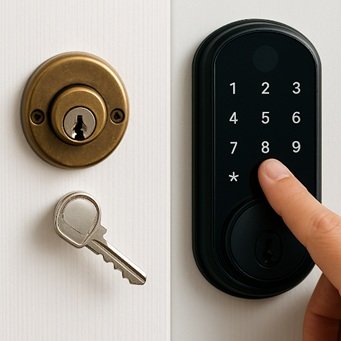Security is one of the most critical considerations for any home or business. As lock technology continues to evolve, users are faced with a growing decision: stick with the tried-and-tested mechanical lock mechanism or embrace the modern convenience of a smart door entry system. Each option comes with its own advantages and vulnerabilities, but the key question remains—which is safer?
Let’s break down both types and compare their strengths to help you make an informed decision.
Understanding the Basics
Mechanical Lock Mechanism
A mechanical lock uses physical components—like pins, tumblers, or levers—that require a key to operate. This traditional security method has been around for centuries and is known for its reliability, simplicity, and durability. From deadbolts to padlocks, mechanical locks have formed the backbone of physical security across residential and commercial spaces.
Smart Door Entry System
A smart lock, on the other hand, replaces or enhances the mechanical locking mechanism with electronic controls. Users can unlock doors via smartphones, keypads, biometrics, or even voice assistants. A smart door entry system is typically connected to Wi-Fi, Bluetooth, or other wireless technology, allowing for remote access and monitoring.
Security Strengths and Weaknesses
1. Physical Security
- Mechanical Lock: High-quality mechanical locks are incredibly difficult to bypass physically, especially those with hardened steel construction or high-security pin configurations. However, cheaper models can be vulnerable to picking, bumping, or brute force.
- Smart Lock: Most smart locks still rely on a mechanical component underneath, but some models sacrifice hardware strength for sleek design. While the electronic features are advanced, physical durability varies and may not match the strength of a commercial-grade mechanical lock.
Winner: Mechanical locks for sheer physical resistance.
2. Digital Security
- Mechanical Lock: Since there is no electronic component, mechanical locks are immune to hacking or software vulnerabilities. But that also means no remote control or monitoring features.
- Smart Lock: Smart door entry systems offer advanced digital security features like encryption, two-factor authentication, and automatic locking. However, they are susceptible to cyber threats such as hacking, signal jamming, or firmware vulnerabilities if not properly secured.
Winner: Tie—mechanical locks are safer from digital risks, but smart locks can be more secure with proper setup and updates.
3. Access Control and Convenience
- Mechanical Lock: Physical keys are easy to understand and don’t require power or internet. But managing access is cumbersome—lost keys require lock replacement or rekeying.
- Smart Lock: You can grant temporary or time-based access, revoke entry remotely, and receive alerts when someone enters. Perfect for rental properties, offices, or families with multiple members.
Winner: Smart lock, for modern access flexibility.
4. Power and Connectivity
- Mechanical Lock: Always functional. There’s no dependency on batteries, Wi-Fi, or mobile apps.
- Smart Lock: Requires battery power or connection to a hub. A dead battery or network outage can cause lockouts—though many smart locks include a mechanical key override for emergencies.
Winner: Mechanical locks, for reliability in all conditions.
Which Is Right for You?
Use Case 1: Residential Homes
For homeowners, smart locks offer unmatched convenience. Being able to unlock your front door from your phone or issue a digital key to a guest is a significant upgrade. However, it’s wise to choose a smart lock system that includes a robust mechanical lock mechanism as a backup.
Recommendation: A hybrid approach—use a smart lock with a strong mechanical core.
Use Case 2: Small Businesses
Businesses that require shared or timed access (e.g., cleaning staff, vendors, or shift workers) will benefit from the control and tracking offered by a smart door entry system. Mechanical locks, while secure, don’t scale well for access control.
Recommendation: Smart lock system with encrypted access and activity logging.
Use Case 3: High-Security Environments
Banks, data centers, and other sensitive areas typically rely on high-security mechanical locks or layered systems that include biometric verification and surveillance. Smart locks can complement, but not fully replace, these mechanical lock mechanisms.
Recommendation: Use mechanical locks as a base, with smart components added for additional control.
Balancing Security and Practicality
While mechanical locks offer time-tested protection and independence from technology, smart locks bring convenience and adaptability to modern life. The best security strategy may not be choosing one over the other, but combining both to balance safety, usability, and resilience.
For homeowners seeking ease and control, a smart door entry system can be a game-changer—just be sure to keep it updated and choose a model with a solid mechanical lock mechanism. For businesses, smart access management reduces risk and simplifies operations. And in high-risk environments, the strength and simplicity of mechanical locks remain unmatched.
Ultimately, the safest option isn’t just about the lock—it’s about how well you manage it.



